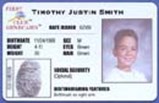Banking on DNA

GeneTree Inc. and SecureCard Technologies Inc. have combined their expertise and technologies to offer a secure bank for DNA deposit. The bank accounts will be available to consumers and their physicians when needed for genetic tests or for identification purposes. The needs of the growing market of paternity testing, distant family relationships, genetic testing, and DNA banking for identification purposes have been addressed by the companies through the creation of two coded databases, which guarantee 100% privacy to the DNA bank account owner and wealth of information to the genome research community. The two companies are seeking academic and industry collaborators.
DNA analysis is an increasingly important source of medically useful information, and interest in banking for the preservation of DNA for analysis at a future time is growing. "The demand in unraveling the wealth of information in personal DNA has been strong due to the progress of the Human Genome Project, genetics education of the population and the use of Internet anonymity," stated Terry Carmichael, founder and CEO of GeneTree and author of the book How to test our family relationships?
Carmichael's company has been an Internet provider of paternity testing since 1997. "The Internet has guaranteed thousands of people anonymity in accessing their own genetic information and family history," he noted. "Furthermore, with the progress in discovering more Y chromosome and mitochondrial DNA markers the technology has allowed us to trace back family relationships through many generations. The increased genealogical interest and the available family information has made DNA samples deposited with GeneTree very valuable."
In addition to the demand for distant family relationships and genetic testing, consumers are becoming interested in DNA fingerprinting for identification purposes. Carmichael approached SecureCard Technologies to discuss the possibility of offering the best system for DNA banking to the consumer.
SecureCard Technologies (Phoenix) is a provider of the FirstClue Identification System. The company works with children, parents and older people, offering cards that include a digital photo and digitally scanned fingerprint, as well as all the vital information. This information is stored in a database.
"The core of the FirstClue System is the production of human and animal identification cards on polished polyvinyl chloride (PVC) plastic," stated Eric Bowers, founder and president of SecuraCard Technologies. "We have four federally submitted patents on the FirstClue System components, i.e. the FirstClue Database, the FirstClue Process and the FirstClue Identification card itself."

The DNA banking strategy
The GeneTree DNA banking strategy has been developed to guarantee absolute privacy and anonymity to the user and a robust process to access vital information when needed in emergencies. GeneTree has developed the GeneSwab Specimen Collection kit, which is a non-invasive way to collect biological material (cheek cells from inside the mouth). SecureCard distributes the kit and they receive the samples. The samples are coded and transferred to GeneTree. All information about the SecureCard owner is entered in the SecureCard database. In this way GeneTree has no access to the personal information of SecureCard owners. At the same time the company SecureCard Technologies does not have access to the information about the location of the owner's DNA.
The user receives a SecureCard, which may contain digital biometrics and all information with a code for the DNA or digitally stored DNA fingerprints. The SecureCard database is directly compatible with AFIS and other identification systems and data can be provided directly to law enforcement agencies.
Business strategy
"Our business strategy is to provide the ultimate service to the consumer, starting with opening a DNA bank account, to preservation of their DNA for a century," explained Carmichael. "The information in people's DNA is sacred because it contains their history."
"We would like to offer peace of mind to the family," added Bowers. "In emergencies it is just a telephone call. Families and appointed by them agencies will be able to use the information as needed."
The DNA and the information stored may be used for research purposes without disclosing source information and with consent of the account owners. In this way wealth of information from genealogical studies will be available.
For more information, contact Terry Carmichael at 888-404-4363.
For further reading:
- Carmichael, T. and Kuklin, A., How to DNA test our family relationships?, AceN Press, Mountain View, CA (2000).
About the author: Alexander Kuklin is a senior marketing manager with BioDiscovery Inc., a leader in DNA microarray image and data analysis software. He writes on applications of new DNA technologies for the general consumer.
